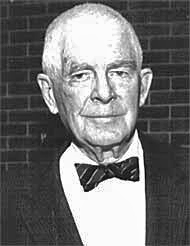Archibald Cox
Archibald Cox, Jr. | |
|---|---|
 | |
| 31st United States Solicitor General | |
| In office January 1961 – July 1965 | |
| President | John F. Kennedy Lyndon B. Johnson |
| Preceded by | J. Lee Rankin |
| Succeeded by | Thurgood Marshall |
| Personal details | |
| Born | May 17, 1912 Plainfield, New Jersey |
| Died | May 29, 2004 (aged 92) Brooksville, Maine |
| Political party | Democratic |
Archibald Cox, Jr., (May 17, 1912[1] – May 29, 2004) was an American lawyer who served as U.S. Solicitor General under President John F. Kennedy, and later became best known as the first special prosecutor for the Watergate scandal.
Early life and law career
Cox was the son of Archibald and Frances Perkins Cox. A native of Plainfield, New Jersey, he attended the Wardlaw-Hartridge School, then called Wardlaw Country Day. Cox graduated from Harvard College in 1934 and Harvard Law School in 1937 where he was a member of Phi delta phi legal fraternity, and joined the Boston law firm of Ropes, Gray, Best, Coolidge and Rugg, now known as Ropes & Gray. During World War II, he was appointed to the National Defense Board, and then to the Office of the Solicitor General.
After the war ended, Cox joined the faculty at Harvard, where he taught courses in torts and in administrative, constitutional, and labor law. During that time, he also became an adviser and speech-writer for John F. Kennedy, who was at that time U.S. senator from Massachusetts. In 1961, Cox joined the new Kennedy administration as solicitor general. At a time when civil rights protesters were routinely chased with dogs and clubbed, he became JFK's point man on pursuing legal remedies to injustice, often appearing before the Supreme Court. Among the cases he was involved in were Baker v. Carr, which set the standards for reapportionment; Heart of Atlanta Motel v. United States, which broke grounds on public accommodations for African-Americans under the Civil Rights Act of 1964; and South Carolina v. Katzenbach, which upheld the Voting Rights Act; In 1965, he returned to the law school.
Watergate special prosecutor
On May 19, 1973, Cox took another leave to accept appointment as the first Watergate special prosecutor. Less than two months following his appointment, Cox learned with the rest of America of Nixon's secret tapes. Over the next few months, Cox, the Senate Watergate committee, and Judge John Sirica battled with the White House over those tapes. During the fight, after Sirica ordered Nixon to comply with the committee and Cox's demand, Cox offered the President a compromise. On October 20, 1973, in an event termed the Saturday Night Massacre, U.S. President Richard Nixon ordered Cox fired, due to Cox's insistence on obtaining secret White House tapes. Rather than comply with this order, both Attorney General Elliot Richardson and Deputy Attorney General William Ruckelshaus resigned. The order was ultimately carried out by the Solicitor General, Robert Bork. Upon being fired, Cox stated, "whether ours shall be a government of laws and not of men is now for Congress and ultimately the American people."
The firing of Cox illustrated the need for independent counsels — prosecutors specifically appointed to investigate official misconduct. After Nixon's resignation, Cox became chairman of Common Cause, and became the founding chair of the Health Effects Institute. Cox argued Buckley v. Valeo, which reformed campaign financing, before the Supreme Court in 1976. He was made an honorary member of the Order of the Coif in 1991. Besides the Paul Douglas Ethics in Government Award, Professor Cox was also the recipient of the Thomas "Tip" O'Neill Citizenship Award.
Death and legacy
Cox died at his home in Brooksville, Maine of natural causes, on the same day as Sam Dash, chief counsel to the Senate Select Committee to Investigate Campaign Practices during the Watergate scandal.
The New York Times wrote, "a gaunt 6-footer who wore three-piece suits, Mr. Cox was often described as 'ramrod straight,' not only because of his bearing but also because of his personality."
Cox was the great-grandson of William M. Evarts, who defended President Andrew Johnson during his impeachment hearing and became Secretary of State in the Hayes administration. He was also a direct descendant of Roger Sherman, a Connecticut signer of the Declaration of Independence; Archibald Cox, Jr. 6, Frances Bruen Perkins 5, Elizabeth Hoar Evarts 4, William Maxwell Evarts 3, Mehitabel Sherman 2, Roger Sherman 1.
Bibliography
A partial list of Cox's books:
- Freedom of Expression (2001) ISBN: 0735102368
- Law and the National Labor Policy (1983) ISBN: 0313237948
- The Role of the Supreme Court in American Government (1977) ISBN: 0198274114
- The Court and the Constitution (1988) ISBN: 039548071X
Notes
- ^ Some sources say he was born 12 May 1912.
Further reading
- "Cox and Nixon" Time. October 29, 1973.
- Gormley, Ken. Archibald Cox: The Conscience of a Nation New York: Perseus Books, 1999. ISBN 0738201472
External links
- Archibald Cox Oral History, audio and transcripts from 2000 interview with Archibald Cox
- Biography from a Department of Justice website
- Bloomberg News story on Cox and Samuel Dash
- Find-A-Grave profile for Archibald Cox
- Articles lacking sources from July 2007
- Solicitors General of the United States
- Watergate figures
- Harvard Law School professors
- Massachusetts lawyers
- Cycloramphus
- Prosecutors
- Harvard Law School alumni
- Harvard University alumni
- St. Paul's School (New Hampshire) alumni
- Baldwin, Evarts, Hoar & Sherman family
- People from Plainfield, New Jersey
- 1912 births
- 2004 deaths

